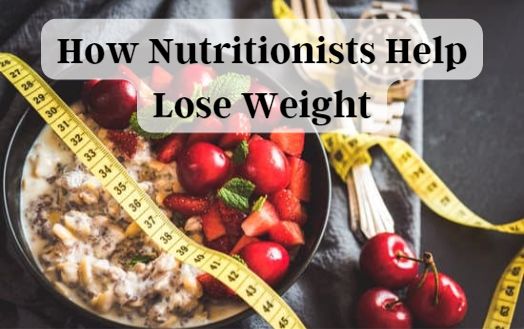Dietitians perform what? Are you curious about this important profession and its effects on our health and well-being? I did some research because I was sure. As a nutritionist, I can say: Dietitians are food and nutrition experts with specialized training in how nutritional choices affect health.
They tailor plans to each person’s medical or lifestyle needs, using their knowledge. They advise on healthy eating, support dietary changes, monitor progress, educate patients and families on nutrition-related health issues, assess nutrient levels, develop meal plans for special diets like veganism or diabetes management, and more.
Working with a registered dietitian can help us improve our health or manage chronic conditions like high blood pressure or diabetes. This article will explain what a dietitian does and why you might want one on your healthcare team. In this article, you will know what is a dietitian and how their services help us.
Overview Of Dietitians
You’ve probably heard of dietitians, but let me explain. Registered dietitians are health professionals. They specialize in nutrition science and help people improve their health. A national exam and supervised practice hours are required for registered dietitians.
Dietitians assess each person’s nutritional needs using evidence-based methods. They tailor meal plans to an individual’s nutritional needs by considering age, lifestyle habits, medical history, culture, preferences, and eating patterns. Their work also includes counseling patients on healthy eating habits, providing advice on how to manage chronic conditions like diabetes or heart disease with dietary interventions, conducting health nutrition research studies, teaching classes or workshops for community groups on various nutrition topics, and creating accurate food and nutrition educational materials like handouts or fact sheets.
I now realize how important dieticians are in healthcare. It’s clear why qualified registered dietitians are essential for everyone making health decisions. Dieticians in the food industry…
Role Of A Dietitian In The Food Industry

Dietitian nutritionists can influence the food industry. I teach healthier eating habits. I work in hospitals, schools, businesses, and other food-serving places.
I work with chefs and restaurateurs to create healthy, customer-pleasing menu items. I also teach healthy meal planning to individuals and organizations. This knowledge improves home cooking and restaurant takeout.
I also research new products. As a dietitian nutritionist, I check labels and ingredients for accuracy and safety before food hits store shelves. This research and feedback ensure that only high-quality foods are sold to the public.
My work ensures proper nutrition in our food supply chain. To live longer and healthier together, I must continue to educate others about good nutrition.
Qualifications Of A Dietitian
As a registered dietitian, I know that success in the food industry requires dietitian qualifications. RDs must have a bachelor’s degree in nutrition or dietetics from an accredited university and complete supervised practice hours. Before becoming an RD, they must pass a national Academy of Nutrition and Dietetics exam.
The American Dietetic Association sets standards for educational programs to ensure graduates meet professional standards. These include courses in science (biochemistry, physiology, chemistry, and microbiology); social sciences (psychology and sociology); management (marketing and economics); communication skills; and public health. The program requires clinical and community experience so graduates can work with diverse populations.
Successful dietitians need more than credentials. A good dietitian will have good communication skills to help clients reach their nutritional goals with individualized plans. They should be able to make food choices based on dietary needs, physical activity, age, medical conditions, and cultural preferences. An effective dietitian will consider all these factors when creating meal plans that fit each person’s lifestyle and promote wellness through healthy eating.
This knowledge base combined with hands-on experience discussing menus with clients, planning meals within budgets or restrictions, providing nutrition education, and other aspects of food service management make qualified dietitians invaluable in the food industry. This expertise requires a lot of training and skill development, which is why becoming a registered dietitian is necessary to succeed in this field.
Areas Of Expertise For Dietitians

As a dietitian, I know nutrition and food science. I advise people on diets using my knowledge. This covers healthy foods for optimal health. I can also advise on medical or allergy-related diets.
I also understand the nutritional needs throughout life. This includes pregnancy and healthy aging advice. Beyond individual counseling, my experience includes menu planning and healthy recipe development.
My goal is to teach people about good nutrition and encourage healthy eating habits. I aim to combine taste and nutrition while equipping clients with success skills. Ready to advance? Dietitians help you reach your goals with personalized meal plans.
What Does Working With A Dietitian Involve
Dietetics is exciting and rewarding. Dietitians help people improve their diets to improve their health. They help people choose healthy foods, plan meals, and find other health professionals.
Dietitians use research to assess your needs and create individualized nutrition plans. This includes considering medical or physical conditions that may affect diet and personal goals like weight loss or energy boosts. Your dietitian will ask about your lifestyle, discuss relevant nutritional information, and offer practical food health tips during the consultation.
Dietitians’ recommendations can improve health over time, according to scientific studies. There are many online resources for staying healthy, but nothing beats having a professional support system that understands nutrition and works with you to improve your health. Let’s examine dietitians’ nutrition plans.
Types Of Nutrition Plans Provided By Dietitians

Dietitians are often asked about their nutrition plans. There are many types, each tailored to the individual’s needs. Clinical nutrition assesses, diagnoses, and treats food-related health issues. Nutritional food provides balanced meals from all food groups to encourage healthy eating. Finally, nutrition programs create customized meal plans based on dietary needs.
As a dietitian, I work with each client to create a nutrition plan that meets their needs and lifestyle. I help people understand how their diets affect their health and make necessary changes. Let’s examine the benefits of dietitian consultation.
Benefits Of Consulting With A Dietitian
Consult a dietitian to make informed health and nutrition decisions. Dietitians must have accredited food and nutrition science degrees to provide evidence-based, personalized advice. They can also provide the most up-to-date nutritional advice.
Dietitians help manage chronic conditions like diabetes and heart disease. Regular check-ins and diet tracking help you control blood sugar and cholesterol. A good dietitian gives practical advice and emotional support.
A registered dietician can help you design a plan that fits your lifestyle, from physical activity to stress.
This involves setting realistic goals based on scientific evidence and motivating people for long-term success and overall well-being. Personalized care from a qualified professional can improve your health and quality of life.
With these benefits in mind, it’s clear why many people work with a dietitian to improve their overall health, making it easier than ever to understand how effective nutritional therapy can be in diabetes management.
Effectiveness Of Nutritional Therapy In Diabetes Management

Medical nutrition therapy has helped me manage diabetes as a dietitian. Nutrition and dietetics are crucial to diabetes treatment because they lower blood sugar, improve health, and prevent long-term complications. Diabetics can make healthy food choices with professional guidance.
Nutritional therapy teaches people how to mix foods and adjust portions. Since carbohydrates break down into sugars that affect blood glucose levels, monitoring carbohydrate intake throughout the day is important. Nutritional counseling also helps patients avoid processed and sugary snacks, increase fiber intake, and identify lifestyle factors that may affect glycemic control.
Since medical nutrition therapy for diabetes management is customized for each patient, dietary changes become easier over time. Self-management skills improve, allowing people to take charge of their health care plans and improve diabetes management and quality of life. Many type 2 diabetics have benefited from this shift from traditional to modern methods. This answers the question, “What is a dietitian?” and how their services help us.
With these insights on nutritional therapy’s effectiveness in diabetes management, there are pros and cons to choosing between traditional and online dietitians, which we’ll discuss next.
Advantages And Disadvantages Of Traditional Vs Online Dietitians
The pros and cons of traditional vs. online dietitians are worth considering. In-person dietitian nutritionists can offer lifestyle-specific advice. They are more accountable because they can track your progress. However, scheduling appointments with an in-person nutrition expert may not fit our schedules or budgets.
Online dietitians give busy people the flexibility they need to see them regularly. This is especially helpful if you live far from a registered dietician or need help managing health-related dietary restrictions. Many online services offer free recipes, meal plans, and grocery lists that you can use at home without paying a consultation fee.
Virtual consultations may have less personal interaction than in-person ones. It’s also harder to track your food intake without an in-person appointment. However, online consultations provide reliable nutritional advice regardless of location.
How To Find The Right Dietitian For Your Needs

It’s hard to find a good dietitian. Tips for finding the right fit:
- Ask questions: When searching for a dietitian, ask around and get feedback from friends and family about their experiences with different health professionals. Also, take time to research online reviews of any potential practising dietitians.
- Determine credentials: Ensure that the person or clinic you plan on using is legally certified as a registered practitioner in dietetics. Check out their qualifications before making an appointment.
- Plan ahead: Make sure to book an appointment well in advance so that you have plenty of time to prepare any questions or concerns beforehand. This will also give them ample opportunity to familiarise themselves with your individual case and goals prior to meeting.
- Consider location: If possible, look for a local professional who is conveniently located near where you live or work. That way they’ll be easy to access when needed without having to travel too far away from home or office.
- Have realistic expectations: Remember that even though it may seem like finding the “perfect” dietician is all important—what matters more is creating an environment of trust between yourself and your chosen practitioner so both parties can reach productive results together.
Take into consideration these points and don’t forget to do your own research when looking for a qualified professional who meets all your criteria – healthcare should always come first.
Average Costs For Consulting With A Dietitian
Dietitians help people manage their health by studying science, nutrition, and food. They can advise on healthy eating and nutrition-based disease management. The Dietitians Association of Australia requires accredited practicing dietitians to be highly trained nutrition professionals (DAA).
Dietitians’ fees vary by location, service, and insurance coverage. If your condition qualifies, some services may be free or discounted. Before scheduling an appointment, call your insurance company to find out what’s covered.
Some dieticians offer discounted rates for long-term care plans or packages, which could save you money. Since practitioner prices vary greatly, it pays to shop around and compare prices. To ensure you’re getting trustworthy advice from a dietician who can help you reach your goals, read online reviews.
Insurance Coverage For Services Provided By A Dietician
I help people reach their goals as a dietitian. Clients must understand dietitian insurance coverage. Hospitals, long-term care facilities, wellness centers, private practices, community programs, and more employ nutritionists.
Depending on your policy, insurance may cover dietician visits. Contact your insurer to confirm coverage policies. They usually require doctor preauthorization before covering dietician costs. Even if your insurance does not cover dietician visits, participating providers may offer discounts, or the clinic may offer payment plans.
Don’t let cost stop you from getting the financial help you need. We’ll discuss dietician consultation questions next. This vital information can make all the difference in your health and wellness journey.
Common Questions To Ask During An Initial Consultation With A Dietician
After discussing dietitian insurance coverage, it’s important to consider some common questions to ask during an initial consultation. A nutritionist can help you set and achieve healthy eating goals. Long-term health requires nutrition education and food science.
To maximize your dietitian consultations, you should know a few things. First, determine which nutrition plan suits your lifestyle. Your diet can be customized by a dietician. They can also advise on adding vitamins and minerals to each meal. They may also suggest ways to curb snacking and overeating habits.
A dietician should also know about any physical activity restrictions. An initial visit should cover whether certain exercises will help or hinder your goal. If needed, the dietician will work with doctors or physical therapists to determine appropriate physical activity levels and safe guidelines for introducing new fitness routines.
Knowing these tips before meeting with a nutritionist will help you reach your dietary goals and stay safe by guiding your physical activity. This segues nicely into our next section: long-term nutrition tips.
Tips For Maintaining Good Nutrition Habits Long-Term

Long-term nutrition is vital to health. Dietitians can advise people on healthy eating and nutrition. Long-term nutrition tips:
First, make a single change. For instance, add an extra serving of fruits and vegetables each day until it becomes a habit. This will help you adjust to healthier foods.
Consult a food nutritionist or dietician. They can advise you on how to meet your specific dietary needs and goals to support your health journey. They can also answer questions about long-term success-boosting foods and nutritional habits.
Finally, use apps or websites to plan meals based on your nutrient needs and preferences. This eliminates guesswork—just refer to your plans when needed. This will help you eat healthy all week without feeling overwhelmed.
Working with a dietician can help you maintain good nutrition habits over time and maximize their health benefits.
The Impact On Overall Health And Wellbeing From Working With A Dietician
Dietetics has greatly improved my health. I was missing scientific nutrition advice from dietitians about food and lifestyle choices for optimal health. My dietitian has helped me make better food choices to improve my health and manage my medical conditions.
Since starting this journey with them, my life has changed dramatically. I’m healthier than ever, have more energy, and sleep better. They also created custom meal plans to meet my needs, which helped me stay on track. They also showed me how small dietary changes could lower chronic disease risk factors like diabetes and heart disease.
I think working with a dietitian can help anyone improve their nutrition and health. They’ll help you make healthy choices for yourself and your family without overwhelming you with information.
Final Thoughts: What Is A Dietitian
Dietitians have a rewarding career. You can help people who need health advice with the right education and certification. I love being a dietitian because I can help others with my nutrition knowledge.
Understanding the difference between a dietitian and a nutritionist and having the right certifications or licenses is crucial for anyone considering entering this field. Dietitians may be covered by insurance, making them easier to reach for dietary advice. Finally, modern technology allows you to consult with your dietitian remotely. Now you know what is a dietitian and how they help us achieve a healthier body.
Dietitians work hard, but the rewards are worth it. I love helping people with nutrition advice.
FAQ
How Long Does It Take To Become A Dietitian?
Becoming a dietitian is something that I have been considering for some time now and I’m sure many people are curious as to how long it takes. It’s quite an involved process, but the rewards can be great. Here is what you need to know about becoming a dietitian:
- First and foremost, you’ll need to complete an accredited bachelor’s degree program in nutrition or dietetics.
- After completing your undergraduate studies, candidates must pass the Registration Exam for Dietitians (RD exam) administered by the Commission on Dietetic Registration of the Academy of Nutrition and Dietetics.
- Once registered, continuing education courses may be required depending on state regulations. Additionally, there are often additional certifications available such as Certified Diabetes Educator (CDE).
- In order to maintain registration status with the CDR, RDs must meet certain criteria each year which includes hours of continuing professional education credits within specific areas every five years.
- Finally, licensure requirements also vary from state-to-state so this should definitely be taken into account when deciding if this career path is right for you.
If you pursue postgraduate studies or other certifications like those above, the process could take three to six years. A good organization will help if you choose this path. Keep your educational background and experience documentation up-to-date so it can be easily accessed. Working hard and staying motivated will help you become a fully qualified dietitian.
Knowing more about the profession—from private practice to working in hospitals or schools—will help you become a successful dietitian. Anyone can get their dream job with dedication. Dieticians work hard, but if done right, they have great job satisfaction and personal growth opportunities.
What Is The Difference Between A Dietitian And A Nutritionist?
Dietitians and nutritionists are often confused when it comes to nutrition and health. Understanding the differences can help you choose a career or profession.
Dietitians and nutritionists study food and its effects on health. They differ in education and expertise. Dietitians must earn a bachelor’s degree in nutrition from an accredited university to become certified. Before state boards or the Academy of Nutrition and Dietetics certify them, they complete supervised practice hours. Dietitians are trained in nutritional assessment, food service management, meal planning, and how diets affect medical conditions.
Nutritionists may know general nutrition principles, but most have no industry licenses or certifications and no formal education beyond high school. Since they lack qualifications, many states limit their advice and services. However, some states allow trained non-dietitians to provide basic counseling services under certain conditions. Some employers hire unlicensed nutritionists who specialize in cooking classes without any additional education beyond culinary arts.
A registered dietician is the best choice if you want someone with extensive clinical experience helping clients improve their diets. An experienced, non-registered specialist may be able to help you choose healthy foods, whether they’re vegan or not.
Are Dietitians Regulated Or Certified?
Dietitians are licensed. Providing proper nutrition advice from qualified professionals is part of the job. Dietitian certification highlights:
1. Dietitians must obtain a bachelor’s degree in nutrition or food science before they can be licensed as a Registered Dietitian (RD).
2. To become certified, RD candidates must pass an exam administered by the Commission on Dietetic Registration (CDR).
3. Most states also require continuing education credits each year to maintain licensure.
This level of regulation reassures me that dieticians are well-versed in nutrition and health. I’m interested in becoming a dietician, and I know there are specific requirements.
Employers and clients can trust your nutritional advice if you’re certified or registered. This builds trust, which is essential for providing quality services that benefit recipients.
Is Consulting With A Dietitian Covered By Insurance?
Insurance coverage for dietitian visits is a common question. Everyone wants to improve their health and lifestyle without unexpected costs. Luckily, many insurance plans cover dietitian visits.
Plan coverage varies. Before covering a visit, your provider may require certain steps or criteria. Your primary care physician may refer you and pre-approve you. Contact your provider to find out what your insurance policy requires for dietitian visits.
Dietitians’ services may not be covered if they’re not medically necessary. If you have a medical condition like diabetes or hypertension, insurers may approve more services, depending on the case and plan. Consult the dietician and insurer before treatment to determine costs.
Before scheduling appointments and treatments with a dietitian, check your insurance coverage to save money and improve your health.
Is It Possible To Consult With A Dietitian Remotely?
I’m thinking about consulting with a dietitian remotely. I’m happy to say yes after some research. Dietitians are increasingly offering video or phone consultations. This helps people like me who don’t live near a qualified professional.
Online scheduling and matching give you more options. Before choosing a professional, you can easily compare their experience, qualifications, and client reviews. Online consultations eliminate the need to schedule around work or family obligations.
Virtual consultations provide the same personalized guidance and ongoing support as in-person sessions. Digital advice is easier and less stressful without compromising quality.




